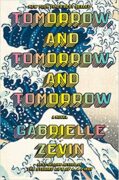2023 Summer Faculty Reading List
Looking for a good book or two to dig into this summer? Now in its 12th year, the Stanford Law School faculty’s Summer Reading List offers up some of our professors’ favorite reads.
Evelyn Douek, Assistant Professor of Law, recommends Gabrielle Zevin’s Tomorrow, and Tomorrow, and Tomorrow
This year, I loved Tomorrow and Tomorrow and Tomorrow, a great summer read about friendship, love, life and…. game design. You definitely do not need to be a gamer to enjoy!
Richard Ford, George E. Osborne Professor of Law, recommends Sarah Bakewell’s At the Existentialist Cafe: Freedom Being and Apricot Cocktails and Humanly Possible
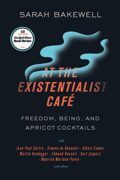
At the Existentialist Cafe is a lovely account of some of the most important philosophers of the 20th century: Husserl, Sartre, de Beauvoir, Camus, Merleau-Ponty, Arendt. Bakewell places some difficult texts in the context of history and of the individual lives of their authors. It makes the case both for and against the work of Heidegger, the German philosopher-turned-Nazi collaborator (despite his influence, “against” wins handily), explains the fraught relationship between Sartre and de Beauvoir and why both of them defended an increasingly vicious Soviet communism, even at the expense of their friendship with Camus and Merleau-Ponty. Plus: apricot cocktails. Mix up this one to accompany your reading: the Flor de Jerez: 1/2 oz rum, 1.5 oz Amontillado sherry, 1/4 oz apricot liqueur, 3/4 oz lemon juice, 1/2 sugar syrup, dash of Angostura bitters, shaken and served up. Close your eyes and you could be sitting at a rive gauche cafe.
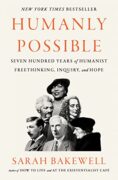
After reading At the Existentialist Cafe I was excited to read Bakewell’s latest and I wasn’t disappointed. Here she explores “humanism”—a pretty broadly sketched set of ideas that begin in the Renaissance (or maybe even classical Greece) and carry on to the present day. Bakewell frames humanism as a vibrant, hopeful and, of course, humane worldview that embraces human flourishing, rationality and open-mindedness and opposes dogma, repression, and superstition. She touches on topics as diverse as Castiglione’s notion of sprezzatura, the cheerful atheism of David Hume, the searing prose and media savvy self-portraiture of Frederick Douglass and the utopian universalism of Esperanto. Bakewell makes a spirited and compelling defense of liberal humanism just in time to meet the many challenges it faces today from right-wing ethnographic-nationalism, religious zealotry, illiberal leftist dogma, and “post-humanist” defeatism. The only thing it’s missing is a cocktail. Might I suggest the highly cosmopolitan Last Word: equal parts Chartreuse (made by cloistered French monks), Maraschino (Italian), lime juice (the Americas) and London dry gin, shaken and served up.
Lawrence Friedman, Marion Rice Kirkwood Professor of Law, recommends Ed Larson’s American Inheritance: Liberty and Slavery in the Birth of a Nation, 1765-1795
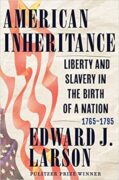
For those who are historically minded, I recommend Ed Larson’s new book, American Inheritance, on the role of the slavery debate during the period of the revolution and the early Republic.
Robert Gordon, Professor of Law, Emeritus, recommends Brad Snyder’s Democratic Justice: Felix Frankfurter, the Supreme Court, and the Making of the Liberal Establishment and Michael Gruber’s Tropic of Night, Valley of Bones, and Night of the Jaguar
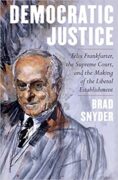
I can’t recommend too highly Georgetown law professor Brad Snyder’s massive (979 pp.) biography of Felix Frankfurter. In 1936 Fortune magazine called Frankfurter “the most influential single individual in the United States” because of his role as de facto personnel director for the New Deal. Snyder follows Frankfurter from his Austrian childhood through his youthful careers as a progressive pro-labor lawyer, scholar, and Roosevelt advisor to his long tenure as a Supreme Court justice. The book is written clearly and gracefully, and is generous and sympathetic to its subject, who could be very irritating at times, especially towards fellow justices. Writing Frankfurter’s life is a formidable task because he was a whirlwind of activity, churning out more letters and memos in a day than most even very busy other lawyers manage in a month. Frankfurter, who left his imprint on every facet of legal thought and legal action in the first half of the 20th century, finally has a fitting memorial.
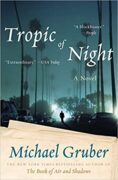
I am not, as a rule, a fan of the supernatural, but Gruber’s trilogy of detective novels featuring Jimmy Paz, a Miami detective of Cuban extraction and son of a Santeria priestess, is fascinating and terrifying, enchantingly written, and makes magical happenings completely and chillingly plausible.
Hank Greely, Deane F. and Kate Edelman Johnson Professor of Law, recommends An Officer and a Spy by Robert Harris, Song of the Cell by Siddhartha Mukherjee, Doing Justice by Preet Bharara, The Blood Telegram by Gary J. Bass, and A Memory Called Empire by Arkady Martine
I have four new recommendations this time and one “like” for someone else’s previous suggestion.
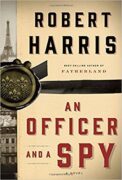
The “like” is for Robert Harris’s, An Officer and a Spy, a novel very closely based on the Dreyfus Affair. Michael McConnell recommended it in one of these compilations; I tried it and was captured…and educated.
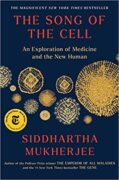
The four new ones come from a mix of genres.
If you like science, I recommend Siddhartha Mukherjee’s, Song of the Cell. Mukherjee has previously written successful books about the science and impact of cancer and of genetics. This one is about the “atoms” of our biology—cells. I’ve worked on issues around cell research and therapy for 25 years but I still learned from this book, while thinking it would also be great for people who knew nothing about biology.
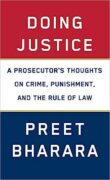
If you like law, I’ll push Preet Bharara’s, Doing Justice. Bharara, former U.S. Attorney for the Southern District of New York (until fired a year into the Trump administration) mixes war stories about investigations and trials with insights into American politics and just plain wisdom. I listened to it as an audiobook read by the author, now a noted podcaster. His reading made it even more compelling.
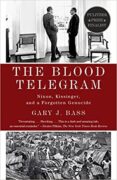
If you like history, I suggest Gary J. Bass, The Blood Telegram. The “Blood” in the title is the last name of the U.S. consul in what was then Dhaka, East Pakistan in the early 1970s. He reported to Washington about the genocide committed there by West Pakistan’s army, with material support from and the acquiescence, and arguably blessings, of Richard Nixon and Henry Kissinger.
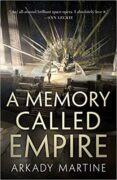
And, if you like science fiction, I urge you to try A Memory Called Empire by Arkady Martine, winner of the 2020 Hugo Award for best novel. There’s a large empire with a complex and fascinating culture, a plucky little space station with a secret neurological enhancing technology, and a young female ambassador from the latter to the former. The world building is great, the characters seem real, and the plot is…non-obvious. (Plus, its sequel, A Desolation Called Peace, which I am now reading, won the 2022 Hugo.)
Mark Lemley, William H. Neukom Professor of Law, recommends Emily St. John Mandel’s Sea of Tranquility
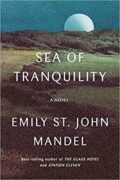
Another stunner from the author of Station Eleven, this is a quick read but also a book that will stay with you. A beautiful parable about time and the interconnectedness of all things.
Lisa Larrimore Ouellette, Deane F. Johnson Professor of Law, recommends Vaishnavi Patel’s Kaikeyi, Colson Whitehead’s Harlem Shuffle, and Brad Snyder’s Democratic Justice: Felix Frankfurter, the Supreme Court, and the Making of the Liberal Establishment
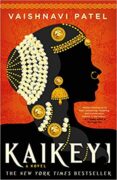
I’ve read a number of feminist retellings of classic stories this year, mostly focused on Greek epics, but one of the most interesting was Vaishnavi Patel’s Kaikeyi, which reexamines the story of a wicked stepmother from the Ramayana. And it was only after I finished Kaikeyi that I realized the author is currently a law student!
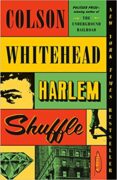
I also loved Colson Whitehead’s Harlem Shuffle, a crime caper set in early 1960s Harlem, concluding with the Harlem riot of 1964. It was very different in style than either The Underground Railroad or The Nickel Boys (which were also fantastic) – more lighthearted, but still incisive.
Finally, one of my favorite nonfiction reads this year has been Brad Snyder’s Democratic Justice: Felix Frankfurter, the Supreme Court, and the Making of the Liberal Establishment. It’s both a well-researched biography of a man who was deeply involved in many notable episodes of 20th century U.S. history and an interesting argument for reappraising Frankfurter’s legacy as a Supreme Court justice, including his advocacy of judicial restraint.
A. Mitchell Polinsky, Josephine Scott Crocker Professor of Law and Economics, recommends Jonathan Franzen’s Crossroads and The Corrections
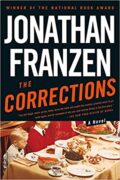
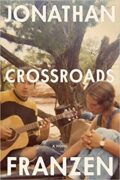
Robert Rabin, A. Calder Mackay Professor of Law, recommends Elena Ferrante’s The Lying Life of Adults
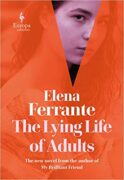
A complex, sharply written exploration of the world of a young adolescent enmeshed in the conflicts and pretentions of her extended family.

